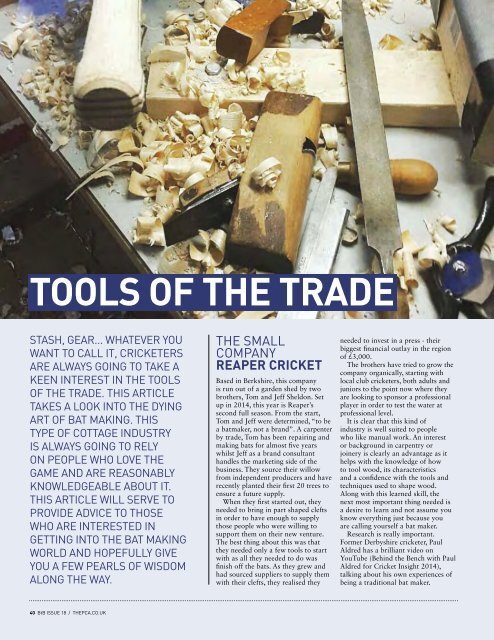jack bannister
1ViA01N
1ViA01N
Create successful ePaper yourself
Turn your PDF publications into a flip-book with our unique Google optimized e-Paper software.
Tools of the Trade<br />
Stash, gear... whatever you<br />
want to caLL it, cricketers<br />
are always going to take a<br />
keen interest in the tools<br />
of the trade. This article<br />
takes a look into the dying<br />
art of bat making. This<br />
type of cottage industry<br />
is always going to rely<br />
on people who love the<br />
game and are reasonaBLy<br />
knowledgeaBLe about it.<br />
This article wiLL serve to<br />
provide advice to those<br />
who are interested in<br />
getting into the bat making<br />
world and hopefuLLy give<br />
you a few pearls of wisdom<br />
along the way.<br />
The small<br />
company<br />
Reaper Cricket<br />
Based in Berkshire, this company<br />
is run out of a garden shed by two<br />
brothers, Tom and Jeff Sheldon. Set<br />
up in 2014, this year is Reaper’s<br />
second full season. From the start,<br />
Tom and Jeff were determined, “to be<br />
a batmaker, not a brand”. A carpenter<br />
by trade, Tom has been repairing and<br />
making bats for almost five years<br />
whilst Jeff as a brand consultant<br />
handles the marketing side of the<br />
business. They source their willow<br />
from independent producers and have<br />
recently planted their first 20 trees to<br />
ensure a future supply.<br />
When they first started out, they<br />
needed to bring in part shaped clefts<br />
in order to have enough to supply<br />
those people who were willing to<br />
support them on their new venture.<br />
The best thing about this was that<br />
they needed only a few tools to start<br />
with as all they needed to do was<br />
finish off the bats. As they grew and<br />
had sourced suppliers to supply them<br />
with their clefts, they realised they<br />
needed to invest in a press - their<br />
biggest financial outlay in the region<br />
of £3,000.<br />
The brothers have tried to grow the<br />
company organically, starting with<br />
local club cricketers, both adults and<br />
juniors to the point now where they<br />
are looking to sponsor a professional<br />
player in order to test the water at<br />
professional level.<br />
It is clear that this kind of<br />
industry is well suited to people<br />
who like manual work. An interest<br />
or background in carpentry or<br />
joinery is clearly an advantage as it<br />
helps with the knowledge of how<br />
to tool wood, its characteristics<br />
and a confidence with the tools and<br />
techniques used to shape wood.<br />
Along with this learned skill, the<br />
next most important thing needed is<br />
a desire to learn and not assume you<br />
know everything just because you<br />
are calling yourself a bat maker.<br />
Research is really important.<br />
Former Derbyshire cricketer, Paul<br />
Aldred has a brilliant video on<br />
YouTube (Behind the Bench with Paul<br />
Aldred for Cricket Insight 2014),<br />
talking about his own experiences of<br />
being a traditional bat maker.<br />
40 BtB issue 18 / thepca.co.uk


